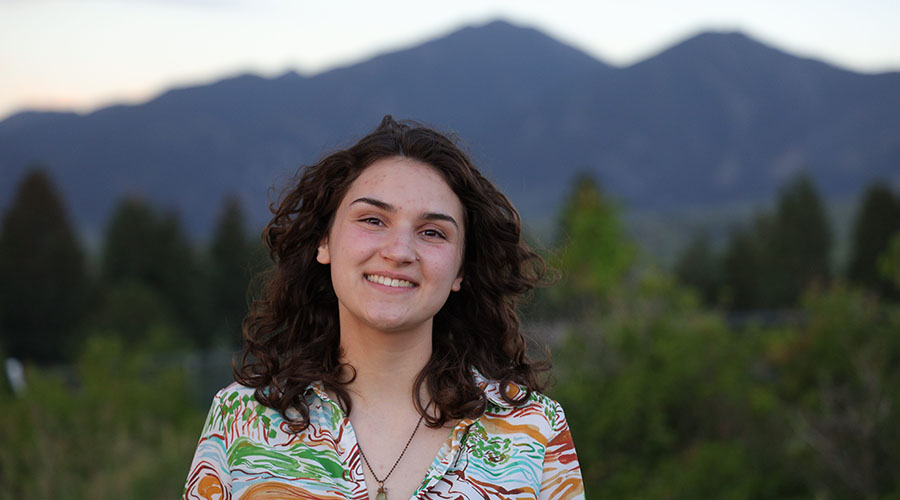
November 2023 (Volume 32, Number 11)
Start Your Search For a Summer REU Now (and Other Advice From a Physics Major)
Anne Monroe, a college junior majoring in physics, reflects on her internship experience and shares advice.
By Liz Boatman | October 13, 2023

Credit: Lane Scheel
Anne Monroe in Montana during her summer research internship at MSU-Bozeman.
Barely back on campus for her junior year at Gustavus Adolphus College in Minnesota after a summer research internship in Montana, physics major Anne Monroe is already thinking about what type of internship she’ll do next summer.
“I’ve always wanted to be a part of science as a whole, to be part of a team working to add to the collective body of human knowledge,” says Monroe.
Her internship, part of the federally funded Research Experiences for Undergraduates (REU) program, gave Monroe the chance to work directly with research scientist Aki Takeda in Montana State University-Bozeman’s Solar and Space Physics Program. Under Takeda’s mentorship, Monroe sought to help answer an important question: Does the Sun’s x-ray irradiance — a measure of the amount of light that reaches Earth — vary with latitude?
It’s an interesting question, says Monroe, in part because the Sun, a ball of plasma, experiences what’s known as “differential rotation,” where the plasma near the poles takes much longer to complete one revolution than the plasma at its equator. In contrast, all of Earth completes one revolution in just 24 hours.
Monroe says gaining insight into the Sun’s x-ray irradiance could increase our understanding of sunspots, associated with solar flares and coronal mass ejections. These ejections emit plasma, x-rays, and magnetic fields, bombarding Earth and sometimes disrupting power grids.
Monroe spent the first half of the summer getting acquainted with the Hinode Solar Optical Telescope, a Japanese mission (“Hinode” means “sunrise”) that has partnered with the United Kingdom and NASA — as well as 16 years’ worth of raw data and a 1970s programming language, IDL.
“By the end of the program, I was proficient in and comfortable with an entirely new programming language,” she says.
“The experience makes me think I want to do something more related to instrumentation, actually,” says Monroe. “I found it really fascinating to gain visibility into the technology of the satellite I was working with, and to learn about its limitations.”
As she gears up to search for her third internship, Monroe has advice for other physics majors.
“Start your [internship] search early — start during winter break or even fall break,” she says. “Don’t wait until January 20th and then realize all the deadlines are February 1st.” Monroe suggests setting aside several hours to scroll through NSF’s REU website. “Instead of thinking, ‘what should I be interested in,’ think about what you’re actually interested in,” she adds. “Then bookmark the projects that get you excited.”
Monroe says she’ll also think about where she’d like to live for a summer — she uses the location filter as she searches — and an internship’s pay and start date. Department culture is important to her, so she’ll consider the number of women faculty and scientists in the program before deciding on her top internship choices. Faculty pages are a great place to start.
Monroe says she realizes, in hindsight, that she took a risk by applying to just six opportunities last year, even though she landed her top choice. Because REUs offer decent summer pay and are a great résumé item for grad school applications, they tend to be highly competitive.
For next summer, Monroe plans to apply to even more internships. She suggests casting a wide net, “because some of the ones that you don’t think you’re qualified for, you might be exactly what they want. Some programs want somebody with no experience. They want to train you in.”
When it comes to recommendation letters, Monroe says to make sure you ask early, to give professors and mentors enough time to write effective letters. And to get strong letters, only request them from “people who have seen [your] best work.”
Then, if you land an offer next spring, get ready to do your own work. “Do all the things that you think a diligent student would do,” Monroe says, like reading books to learn more about your project and familiarizing yourself with the journal literature. Monroe talked with her PI, Takeda, upfront about how often they would communicate.
For Monroe, the best part about a summer internship away from home isn’t the knowledge you gain, but your growth as an independent person.
“It was my first time truly living alone across the country, with all new people,” she says. “It gave me the confidence to come back to this semester feeling like I’m an adult, and the space to grow into the person I hoped I could become.”
Liz Boatman is a staff writer for APS News.
Visit APS programs and resources for undergrads to further your education and get involved in research. You can also search for an NSF-funded REU site, or explore internship opportunities at national laboratories or NASA research facilities.
©1995 - 2024, AMERICAN PHYSICAL SOCIETY
APS encourages the redistribution of the materials included in this newspaper provided that attribution to the source is noted and the materials are not truncated or changed.
Editor: Taryn MacKinney
November 2023 (Volume 32, Number 11)
Articles in this Issue
